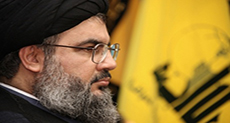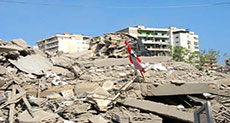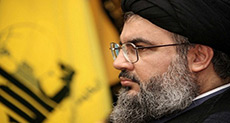The Resistance Anew

Source: Assafir, 31-3-2006
Former Minister and MP Bechara Merhej
Despite the heated debate witnessed at the Khartoum summit on the resistance topic between President Lahoud and PM Saniora and the ensuing damages to Lebanon and its reputation, further discussion seems to be needed on this pivotal issue in the lives of the Lebanese, before reaching a unanimous fortified stand capable of protecting Lebanon during this phase. A phase when betrayal has become confused with wisdom, sticking to identity now equivalent to naivety and submission to foreign powers is simply a view point.
Paradoxically up until now, the ongoing discussion is as if it is concerning the existence and influence of an organization, whereas the issue basically relates to Lebanon and its protection, in addition to the roles of the resistance, the army and other establishments in providing such a protection. Knowingly, this protection shall furnish Lebanon with guarantees of peace and stability against a background of unrestrained daily Israeli escalations, coupled with the international community failing to enforce even a single international decision on this usurping entity, ranging from Resolution 194 concerning the Right of Return, to the decision by the International Criminal Court on dismantling the Racist Fence, through the Road Map as endorsed by the world`s big tyrants.
The resistance, an initial popular reaction to the Zionist occupation, managed to form an exceptional example through its struggle, steadfastness and tenacity in resisting the occupation, cracking its prowess and filling the vacuum caused by its traditional military superiority. Through sweeping popular mobilization and non-traditional confrontation styles, the Israeli occupation found itself hemmed in amid a well-knit and strengthening public siege, thus imposing a tightening grip and isolating it into defensive fortifications, which quickly collapsed under the strikes of the resistance and the ever ready to be martyrs-fighters.
Facing this popular state of confrontation, the invaders found themselves pressured into withdrawing partially, then completely, after breaking down their weapons and the cost of occupying Lebanese land became greater than the cost of withdrawing. Following its forced withdrawal from the South and Western Bekaa, except Shibaa Farms and Kfar Shouba hills where huge observation posts are installed and rich springs exist, Israel gambled on the resistance falling in the mud of power and control.
However, the resistance succeeded in disappointing Israel by interacting the people, including those who opposed and backstabbed it, with a high degree of transparency and impartiality. Yet, it managed to be elected into the House of Representatives and joined the Cabinet without getting entangled in the corruptions of rule.
By this jihad spirit and political wisdom, derived from past experiences and mistakes, the resistance turned into a gravitational center on national, Arab and Islamic scales, drawing admiration and pride, at a time when real and serious possibilities are being considered to resist Israel`s plots of turning its surroundings into small, torn and weak countries, ready to submit and join the Greater Middle East project.
In this context, as far Israel is concerned, it was natural for the resistance to become a target that ought to be eliminated and to limit its influences in a wounded region, like a volcano boiling with refusal to occupation, intimidation and defeat.
Israel managed to make international powers antagonistic with the resistance through falsely linking it to terrorism. Simultaneously conscious of the fact that this antagonism will not yield fruit unless coupled with successive campaigns to weaken the resistance, on its own territory, dismantle the national fabric surrounding it, and transform its image within the general national mind to a denominational movement, using its weapons to destabilize internal balances to attach Lebanon to a regional axis.
Therefore, the continuous foreign intervention aimed at splitting the unified Lebanese stance over the resistance; hence the unjust campaigns launched at the resistance by international figures who considered that appeasing Tel Aviv and the White House is an opportunity to hold advanced high positions in New York and elsewhere.
The last of these campaigns appeared in the UN Secretary-General envoy, Terje Rod-Larsen`s insistence on considering the resistance as simply a militia, necessary to be merged with the Lebanese Army. Thus he forestalled, while exerting pressure on the Lebanese dialogue after the surprise he received of the conferees` majority insisting on taking peaceful patriotic stands towards it.
Stripping the resistance of its weapon, as wanted by Larsen, means ridding Lebanon of the principal power element it possesses to liberate its land and deter aggression. Yet talk of guarantees in return for Lebanon`s abandonment of the resistance is rejected because such guarantees have not held even once in the past in Sabra and Shatila, Qana, even the recent Jericho case when the American-British coalition preferred to succumb to Israeli logic instead of fulfilling their pledges.
In conclusion, Israel is not likely to relinquish pursuing the resistance in order to pounce on it and bring down the Lebanese self-dependent model for strength and inspiring to others. Israel will begin again in new ways and with innovated plans, gambling on the Lebanese to divide and on the inclination of some of them to believe, perhaps even sanctify, the international promises.
Present and imminent dangers necessitate preparations be taken, for all probabilities, by the resistance and by those who insist on Lebanon`s sovereignty, while cautiously avoiding internal Khartoum-style altercation disputes which obscure from view, preparations made for a Lebanon devoid of its resistance, weak divided and manipulated by regional and international ambitions.
Former Minister and MP Bechara Merhej
Despite the heated debate witnessed at the Khartoum summit on the resistance topic between President Lahoud and PM Saniora and the ensuing damages to Lebanon and its reputation, further discussion seems to be needed on this pivotal issue in the lives of the Lebanese, before reaching a unanimous fortified stand capable of protecting Lebanon during this phase. A phase when betrayal has become confused with wisdom, sticking to identity now equivalent to naivety and submission to foreign powers is simply a view point.
Paradoxically up until now, the ongoing discussion is as if it is concerning the existence and influence of an organization, whereas the issue basically relates to Lebanon and its protection, in addition to the roles of the resistance, the army and other establishments in providing such a protection. Knowingly, this protection shall furnish Lebanon with guarantees of peace and stability against a background of unrestrained daily Israeli escalations, coupled with the international community failing to enforce even a single international decision on this usurping entity, ranging from Resolution 194 concerning the Right of Return, to the decision by the International Criminal Court on dismantling the Racist Fence, through the Road Map as endorsed by the world`s big tyrants.
The resistance, an initial popular reaction to the Zionist occupation, managed to form an exceptional example through its struggle, steadfastness and tenacity in resisting the occupation, cracking its prowess and filling the vacuum caused by its traditional military superiority. Through sweeping popular mobilization and non-traditional confrontation styles, the Israeli occupation found itself hemmed in amid a well-knit and strengthening public siege, thus imposing a tightening grip and isolating it into defensive fortifications, which quickly collapsed under the strikes of the resistance and the ever ready to be martyrs-fighters.
Facing this popular state of confrontation, the invaders found themselves pressured into withdrawing partially, then completely, after breaking down their weapons and the cost of occupying Lebanese land became greater than the cost of withdrawing. Following its forced withdrawal from the South and Western Bekaa, except Shibaa Farms and Kfar Shouba hills where huge observation posts are installed and rich springs exist, Israel gambled on the resistance falling in the mud of power and control.
However, the resistance succeeded in disappointing Israel by interacting the people, including those who opposed and backstabbed it, with a high degree of transparency and impartiality. Yet, it managed to be elected into the House of Representatives and joined the Cabinet without getting entangled in the corruptions of rule.
By this jihad spirit and political wisdom, derived from past experiences and mistakes, the resistance turned into a gravitational center on national, Arab and Islamic scales, drawing admiration and pride, at a time when real and serious possibilities are being considered to resist Israel`s plots of turning its surroundings into small, torn and weak countries, ready to submit and join the Greater Middle East project.
In this context, as far Israel is concerned, it was natural for the resistance to become a target that ought to be eliminated and to limit its influences in a wounded region, like a volcano boiling with refusal to occupation, intimidation and defeat.
Israel managed to make international powers antagonistic with the resistance through falsely linking it to terrorism. Simultaneously conscious of the fact that this antagonism will not yield fruit unless coupled with successive campaigns to weaken the resistance, on its own territory, dismantle the national fabric surrounding it, and transform its image within the general national mind to a denominational movement, using its weapons to destabilize internal balances to attach Lebanon to a regional axis.
Therefore, the continuous foreign intervention aimed at splitting the unified Lebanese stance over the resistance; hence the unjust campaigns launched at the resistance by international figures who considered that appeasing Tel Aviv and the White House is an opportunity to hold advanced high positions in New York and elsewhere.
The last of these campaigns appeared in the UN Secretary-General envoy, Terje Rod-Larsen`s insistence on considering the resistance as simply a militia, necessary to be merged with the Lebanese Army. Thus he forestalled, while exerting pressure on the Lebanese dialogue after the surprise he received of the conferees` majority insisting on taking peaceful patriotic stands towards it.
Stripping the resistance of its weapon, as wanted by Larsen, means ridding Lebanon of the principal power element it possesses to liberate its land and deter aggression. Yet talk of guarantees in return for Lebanon`s abandonment of the resistance is rejected because such guarantees have not held even once in the past in Sabra and Shatila, Qana, even the recent Jericho case when the American-British coalition preferred to succumb to Israeli logic instead of fulfilling their pledges.
In conclusion, Israel is not likely to relinquish pursuing the resistance in order to pounce on it and bring down the Lebanese self-dependent model for strength and inspiring to others. Israel will begin again in new ways and with innovated plans, gambling on the Lebanese to divide and on the inclination of some of them to believe, perhaps even sanctify, the international promises.
Present and imminent dangers necessitate preparations be taken, for all probabilities, by the resistance and by those who insist on Lebanon`s sovereignty, while cautiously avoiding internal Khartoum-style altercation disputes which obscure from view, preparations made for a Lebanon devoid of its resistance, weak divided and manipulated by regional and international ambitions.




